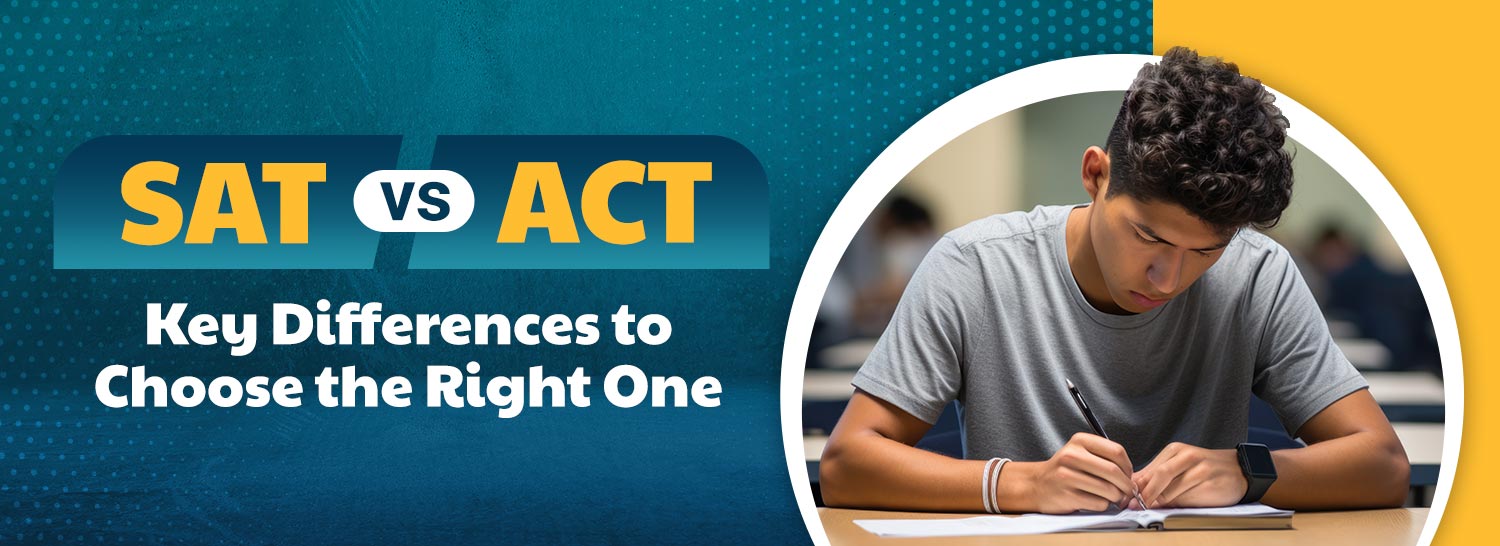SAT vs ACT-Key Differences to Choose the Right One
If you’re aiming to pursue your undergraduate studies in the USA, then you are well aware of the Scholastic Aptitude Test (SAT) and American College Testing (ACT) exams. Both are qualifying exams for entry into an international institute for higher studies. Both cover Reading, Writing and Mathematics and assess prospective students in these subjects. However, there are some differences between the two, and it helps to know them before deciding on which one to take. It’s especially helpful to know them for your SAT preparation. Let’s see what these are.
To begin with, we would like to point out that though there are differences, there are some similarities in these exams as well. One of them is that the writing and reading sections of both exams are passage-based. Also, students do not lose points for incorrect or blank answers and are given points for correct ones. Overall, both exams test students’ readiness for a college education.
Key differences between SAT and ACT
The two formats
The first difference is that the SAT is to be given in a digital format. This means that it also follows the ‘adaptive testing model’, which essentially means that it tests your accuracy in answering questions as you take the test. Based on this, it decides what questions you will get in the next module. So, the level of difficulty of the forthcoming questions will be matched with your ability.
As far as ACT is concerned, it is still to be taken in a pen-and-paper mode. Hence, you will get the same series of questions throughout the exam, in every section, irrespective of your performance.
The sections
The SAT comprises reading, writing, language and maths (where you can use the calculator). ACT also assesses you on English, maths, reading, science, and writing (where the essay is optional). Also, the SAT has a non-calculator section, whereas, for ACT, the calculator is allowed for all the sections.
The difference in scores
Another major difference between the two is the scoring model. In SAT, you garner a score between 400-1600, whereas in ACT, you get anywhere between 1-36. The ACT score, however, excludes the optional ACT writing test, which is scored separately. Colleges and universities use a simple conversion chart that enables them to compare your scores with others. In SAT, the reading and writing, and maths sections use a scale of 200-800 each, which are then combined to arrive at a total score. In ACT, a scale of 2-12 is used for the optional essay writing section, which does not count in your final score.
Also read: Top Universities that Accept SAT Scores – Find Your Path
The duration
 The SAT exam is three hours long, whereas the ACT is 2 hours and 55 minutes without the essay section and 3 hours and 35 minutes if you do choose to write the essay. Do note that the essay in the ACT exam will test you on how well you are able to analyse and evaluate complex issues. So, if you do choose to go for the writing section, be sure to be well-prepared.
The SAT exam is three hours long, whereas the ACT is 2 hours and 55 minutes without the essay section and 3 hours and 35 minutes if you do choose to write the essay. Do note that the essay in the ACT exam will test you on how well you are able to analyse and evaluate complex issues. So, if you do choose to go for the writing section, be sure to be well-prepared.
The science sections
This is mainly to with the science section. The SAT does not have one, but you are tested through the reading passages. On the other hand, ACT does not test your knowledge about science but does stress science-based reading. It, therefore, tests your critical thinking ability in this way. Also, this section consists of 40 MCQs, for which you get 35 minutes.
The Maths sections
Both SAT and ACT cover Algebra I and II, Geometry and Trigonometry, arithmetic and Probability. However, the SAT also covers Data Analysis, while the ACT covers statistics. The SAT gives 80 minutes to answer 58 questions, whereas you have to answer 60 MCQs in 60 minutes if you’re taking the ACT.
The writing/language sections
The SAT assesses you on grammar, punctuation, vocabulary and editing skills, Whereas the ACT tests you on your rhetorical skills, along with grammar, punctuation and sentence structure. Also, there is no optional essay in the SAT, while the optional essay in ACT tests you on evaluation and analytical abilities. Also, in the SAT, the reading test gives students 65 minutes for 52 questions, and the writing and language test is 35 minutes for 44 questions. The ACT has 75 MCQs that must be answered in 45 minutes.
The reading sections
 The SAT contains five reading passages in this section, and each one has a pair of passages. 52 MCQs then follow this, and you get 52 minutes to answer these questions. In the ACT exam, you have 55 minutes to answer 40 reading questions. Also, in ACT, all the questions are in reference to one of four of five long passages. However, in SAT, each question is standalone and contains all the information for the answer. Also, the SAT reading questions are easy to understand and answer compared to the ACT ones.
The SAT contains five reading passages in this section, and each one has a pair of passages. 52 MCQs then follow this, and you get 52 minutes to answer these questions. In the ACT exam, you have 55 minutes to answer 40 reading questions. Also, in ACT, all the questions are in reference to one of four of five long passages. However, in SAT, each question is standalone and contains all the information for the answer. Also, the SAT reading questions are easy to understand and answer compared to the ACT ones.
The cost of each exam
Finally, it is imperative to know the cost of each test, and there are definite differences in this as well. The registration fee for SAT is $60, which is 4,987 Indian rupees. And, for the ACT, it is $68 (no writing), which is 5,652 Indian rupees and $93, which is 7,730 Indian rupees.
The above are some of the main differences between the SAT and ACT exams. Both, however, are equally important, and it all depends on you when it comes to taking one. And, colleges and universities across the US accept both. So, which one you take is entirely your preference. Having said that, if you do plan on taking the SAT, backing up your exam prep with a solid SAT online course ups your scores and, subsequently, your chances of getting into your dream institute. And, TG Campus has just the SAT prep course for you that covers the entire syllabus and makes you exam-ready. So, go ahead and bolster your exam prep with this robust online programme and crack the exam with flying colours.
Also read:














